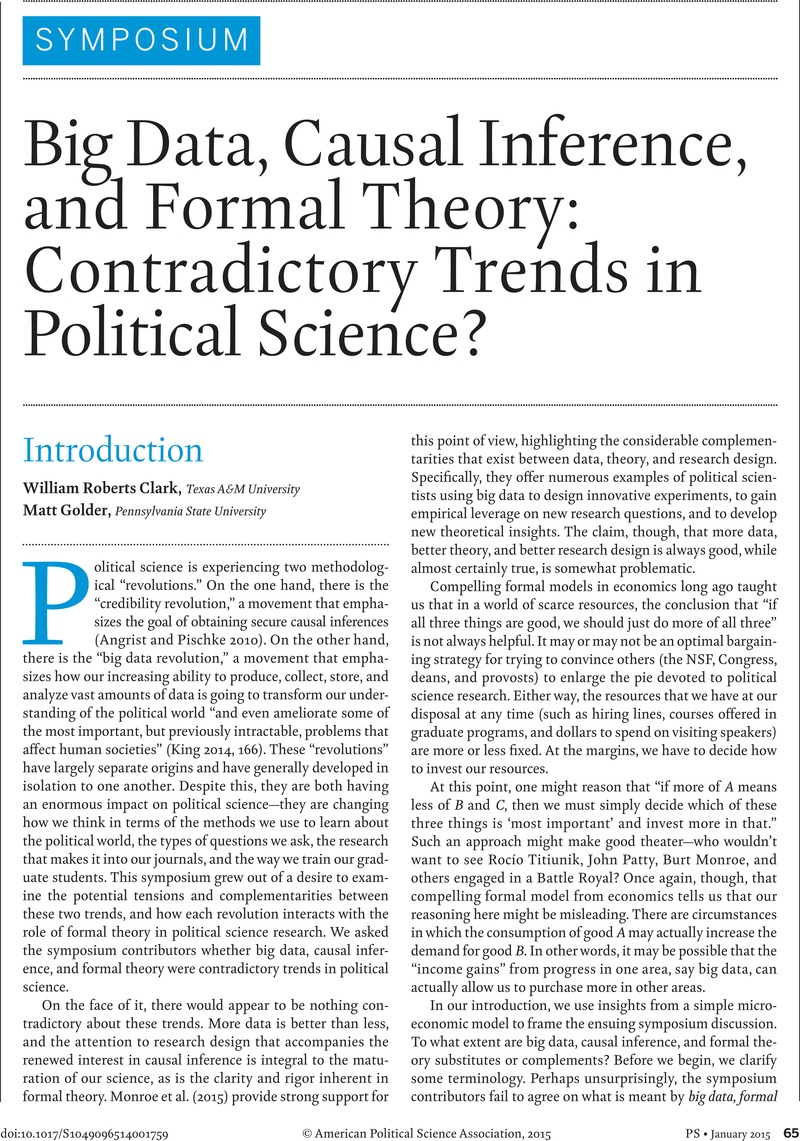Crossref Citations
This article has been cited by the following publications. This list is generated based on data provided by Crossref.
Crabtree, Charles
and
Fariss, Christopher
2016.
Stylized Facts and Experimentation.
Sociological Science,
Vol. 3,
Issue. ,
p.
910.
Mergel, Ines
Rethemeyer, R. Karl
and
Isett, Kimberley
2016.
Big Data in Public Affairs.
Public Administration Review,
Vol. 76,
Issue. 6,
p.
928.
Pang, Xun
2016.
Shared Challenges and Solutions: The Common Future of Comparative Politics and Quantitative Methodology.
Chinese Political Science Review,
Vol. 1,
Issue. 3,
p.
472.
Fatke, Matthias
2016.
Participatory effects of regional authority: decentralisation and political participation in comparative perspective.
West European Politics,
Vol. 39,
Issue. 4,
p.
667.
Canali, Stefano
2016.
Big Data, epistemology and causality: Knowledge in and knowledge out in EXPOsOMICS.
Big Data & Society,
Vol. 3,
Issue. 2,
Fatke, Matthias
2017.
Personality Traits and Political Ideology: A First Global Assessment.
Political Psychology,
Vol. 38,
Issue. 5,
p.
881.
Jungherr, Andreas
and
Theocharis, Yannis
2017.
The empiricist’s challenge: Asking meaningful questions in political science in the age of big data.
Journal of Information Technology & Politics,
Vol. 14,
Issue. 2,
p.
97.
Le Breton, Michel
Blais, André
and
Dellis, Arnaud
2017.
Élections : comportements, mécanismes et réformes.
L'Actualité économique,
Vol. 93,
Issue. 1-2,
p.
5.
Agostino, Deborah
Arnaboldi, Michela
and
Azzone, Giovanni
2018.
Handbook of Research on Modernization and Accountability in Public Sector Management.
p.
254.
Ceron, Andrea
and
Curini, Luigi
2018.
e-Campaigning in the 2014 European elections.
Party Politics,
Vol. 24,
Issue. 2,
p.
105.
Sarker, Md Nazirul Islam
Wu, Min
and
Hossin, Md Altab
2018.
Smart governance through bigdata: Digital transformation of public agencies.
p.
62.
Guo, Chao
and
Saxton, Gregory D.
2018.
Speaking and Being Heard: How Nonprofit Advocacy Organizations Gain Attention on Social Media.
Nonprofit and Voluntary Sector Quarterly,
Vol. 47,
Issue. 1,
p.
5.
Stockmann, Daniela
2018.
Toward Area‐Smart Data Science: Critical Questions for Working With Big Data From China.
Policy & Internet,
Vol. 10,
Issue. 4,
p.
393.
Sarker, Md Nazirul Islam
Hossin, Md Altab
Frimpong, Adasa Nkrumah Kofi
and
Xiaohua, Yin
2018.
Promoting information resource management for e-government through big data approach.
p.
99.
Ingrams, Alex
2019.
Public Values in the Age of Big Data: A Public Information Perspective.
Policy & Internet,
Vol. 11,
Issue. 2,
p.
128.
Brady, Henry E.
2019.
The Challenge of Big Data and Data Science.
Annual Review of Political Science,
Vol. 22,
Issue. 1,
p.
297.
Pang, Hao
Mokhtari, Amir
Chen, Yuhuan
Oryang, David
Ingram, David T.
Sharma, Manan
Millner, Patricia D.
and
Van Doren, Jane M.
2020.
A Predictive Model for Survival of Escherichia coli O157:H7 and Generic E. coli in Soil Amended with Untreated Animal Manure.
Risk Analysis,
Vol. 40,
Issue. 7,
p.
1367.
Sarker, Md Nazirul Islam
Khatun, Most Nilufa
Alam, GM Monirul
and
Islam, Md Shahidul
2020.
Big Data Driven Smart City: Way to Smart City Governance.
p.
1.
Agostino, Deborah
Arnaboldi, Michela
and
Azzone, Giovanni
2021.
Research Anthology on Strategies for Using Social Media as a Service and Tool in Business.
p.
229.
Drax, Katie
and
R. Munafò, Marcus
2021.
The Handbook of Alcohol Use.
p.
49.



